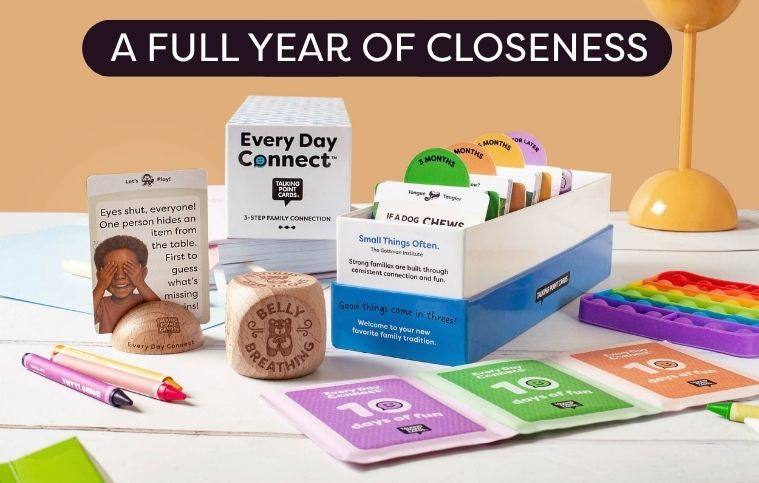SHOP
About

Tips for Great Dinner Party Conversation
March 05, 2024 8 min read
Hosting a dinner party is about more than just serving delicious food; it's about creating an atmosphere where conversation flows as freely as the wine. Whether you're gathering close friends or a mix of new acquaintances, the art of conversation can turn a simple meal into a memorable event.
In this article, we'll explore tips to foster engaging, inclusive discussions that keep everyone at the table entertained and connected. From asking open-ended questions to sharing personal anecdotes, we'll guide you through the nuances of being both a gracious host and a captivating conversationalist. Let's dive into the secrets of sparking lively dinner party dialogue.
Key Takeaways
- Use open-ended questions to encourage diverse and engaging conversations.
- Implement a no phones policy to foster face-to-face interaction and communication.
- Encourage participation from shy or quiet guests to ensure inclusivity.
- Focus on one main conversation to allow everyone a chance to contribute.
- Talking Point Cards serve as great conversation starters for those times when no one knows what to say.
Still struggling to find the right things to ask? See how family conversation cards can engage your whole family!
8 Tips for Great Dinner Party Conversation
Here are some fantastic tips that can bring life to any party, no matter how bleak the occasion might seem. Some tips might seem quite obvious, but there are also those that you've probably never thought about. Let's turn up the gears and get that conversation going from boring to booming.
Ask Open-ended Questions
To get the conversation flowing, a great thing to do is to ask open-ended questions. Sure, you might be tempted to tell a story, but it's a lot harder for people to respond to or engage with a story than it is to answer questions.
If you ask open-ended questions, you give people the chance to give their own answers and input, and it gives the conversation the opportunity to take many different directions.
Stay away from yes or no questions because those don't make for good conversation. Once somebody answers a yes or no question, the topic is dead in the water, and you're already looking for something new to talk about. It's always much easier if you ask questions that spur a meaningful conversation.
That said, if you have a big dinner party, you probably have a diverse array of guests, which means that there are topics you might want to stay away from. You don't want to ask the wrong kind of questions to your dinner party guests and end up offending them.
That's going to create more awkward silence than anything else. Avoiding touchy subjects is always best. On that note, if you struggle to find the right things to ask and say during dinner parties, then our next tip can definitely help you out.
As a general rule of thumb, you should avoid questions about politics, religion, personal finances, health issues, controversial social issues, and career topics (especially when you know someone at the table is struggling).
Use Talking Cards for Help
Enhance your social gatherings with the innovative charm of talking cards. These clever conversation tools are designed to guide your group through a myriad of engaging topics without the risk of stumbling into awkward silences or contentious subjects.
Ideal for any social scenario, from casual meet-ups to formal dinner parties, talking cards serve as the perfect facilitator for dialogue.
What Are Talking Cards?
Talking cards are a set of carefully curated cards designed to facilitate engaging and meaningful conversations among people. Each card poses a unique question or topic, ranging from light-hearted and fun to deep and reflective, intended to inspire participants to share stories, opinions, and experiences.
These cards act as conversation starters, breaking the ice in new or familiar groups and steering interactions towards interesting and unexplored territories. By using talking cards, you can expect to see barriers break down and connections strengthen as everyone dives into discussions that might not have surfaced otherwise.
They are a valuable tool for anyone looking to add depth and direction to their social gatherings, ensuring that every conversation is not just heard but truly listened to and appreciated.
How Can Talking Point Cards Help?
At Talking Point Cards, we've curated a diverse collection of questions, drawing from extensive research in human psychology, to craft conversation starters that resonate with everyone.
Our approach is designed to navigate beyond the surface, fostering genuine connections and memorable interactions. Whether it's for family dinners, intimate gatherings with friends, or meaningful conversations with loved ones, our cards aim to enrich every interaction. They serve as a bridge to deeper understanding and shared experiences, all while keeping the art of conversation alive and well.
Where to Buy Talking Point Cards for Families
If you’re looking to buy Talking Point Cards, you can do that on the shop section of our website. If you’re used to shopping on Amazon, our packs are available there as well! We offer free shipping within the United States, Canada, Australia, and the United Kingdom
No Phones Policy
It’s no secret that everyone is glued to their phones these days. While using a smartphone certainly isn’t optional these days, using one during a dinner party can be a huge conversation killer.
If you're at a dinner party and everybody's just staring at their own phones, you'll end up with a complete lack of conversation and a whole lot of silence.
Therefore, a great policy for any dinner party is to make everyone put their phones away. It automatically takes away a buffer between people and forces them to interact with each other, because they no longer have their phone to pull out as an excuse once a conversation becomes stale and have to rely on conversation to keep them from being bored.

Ask Follow-Up Questions
Speaking of a conversation going stale, you might think that as soon as you run out of something to say about a certain topic, that you need to start talking about something else.
That can put a whole lot of stress on people because you're always looking for new things to say. However, there is a little trick to get around this issue, and that is to ask follow-up questions. If you’re asking something like “What is your comfort food?”, you could ask something like, “Which restaurant do you think makes that food the best?” which would encourage further conversation.
Asking follow-up questions allows you to keep the same conversation and topic flowing nearly indefinitely, and it avoids you having to search for new topics to talk about.
Still having trouble? Here are 22 great conversation starters for your next holiday gathering.
Avoid Interrupting Others
One of the worst things that can happen to any conversation is when somebody else constantly interrupts it, particularly with information or stories that aren't even related to the conversation at hand. First and foremost, interrupting others is just rude and it's bad dinner party etiquette, but, moreover, it's going to put a damper on the occasion.
People will start disliking the person who keeps interrupting everyone, and will actively aim to steer clear of them, and that's no good for conversation.
Furthermore, there are many people who once they are interrupted feel either embarrassed or upset, and then refuse to continue their conversation. Some people might feel really shy, and once they're interrupted, aren't able to reinsert themselves into a conversation. Therefore, avoid interrupting others because it just makes for bad conversation.
Encourage the Quiet Ones
Let’s be honest. We’ve all been the quiet ones at a dinner or a party where everyone else is having fun and we’re not. There’s nothing wrong with the people or the festivities, it’s the feeling of being an outsider that keeps us from truly having fun.
Encouraging the quiet ones in conversations is crucial for fostering an inclusive environment where everyone feels valued and heard. Anxious and introverted individuals often have unique insights and perspectives, but may need more encouragement to share them.
By creating a supportive space that respects their pace and comfort, we can empower them to open up. This involves actively listening, asking open-ended questions that invite elaboration, and acknowledging their contributions positively.
Encouraging quieter members to communicate not only enriches the discussion with diverse viewpoints but also boosts their confidence and sense of belonging. This approach ensures that all voices, not just the loudest, shape the conversation, leading to more balanced and fulfilling interactions for everyone involved.
Make Your Method of Storytelling More Engaging
Ah yes, a story, the staple of any party. The uncle at the back of the room talking about his trip to Malaysia, that one guy that’s talking about the time he got pulled over by the cops. While the story isn’t relevant to the conversation, it can be entertaining, but not always. If your storytelling isn’t good, you might just be making everyone awkward.
To make your story telling more engaging, focus on weaving vivid imagery and emotions into your narrative, drawing listeners into the experience. Use dynamic voice modulation, pauses, and eye contact to create a connection and emphasize key points.
Incorporating elements like suspense or humor can keep the audience hooked, while personal anecdotes or relatable scenarios enhance relatability. Finally, practice your pacing to build momentum and deliver a memorable climax.
Engaging storytelling is an art that captivates the audience, leaving a lasting impression through a blend of content and delivery.
While telling stories can’t be fun, make sure that you’re not the only one contributing. There’s nothing people hate more than that one person that just can’t stop talking about their own life.
Focus on One Main Conversation
While there are hundreds of topics that serve as conversation starters, it might not always be a good idea to continuously start new conversations. This is especially the case if you have a large dinner party with a lot of people who would like to engage. By focusing on one main conversation, you can keep things flowing smoothly.
If there are many people present at the party, chances are that everyone has something to say and contribute, but if you keep starting new conversations, you end up cutting those people off. Give everybody the chance to contribute to a conversation before thinking about starting a new topic.
Closing Thoughts - Can Talking Cards Really Improve Dinner Party Conversation?
Talking Cards might seem like a gimmicky product you see on Tik Tok, but the reality is that they can really improve dinner party conversation. With hundreds of different questions and topics, there's no shortage of things to talk about.
Whether people are shy, new to each other, or there's just an awkward silence, Talking Point Cards can help bring any dinner party or family dinner to life with engaging and entertaining conversation.
Frequently Asked Questions
How Do I Keep Kids Engaged at a Dinner Party Conversation?
To keep kids engaged at a dinner party conversation, the Kids Pack from Talking Point Cards is a great option to consider. It's like the adult version in terms of having many great topics to talk about, but of course, geared more towards children.
How to Make Dinner Conversation?
To make dinner conversation engaging, start with open-ended questions about interests or recent experiences. Share stories or fun facts to spark interest. Listen actively, showing genuine curiosity in responses. Encourage everyone to contribute, creating a welcoming atmosphere for diverse topics. This approach fosters lively, inclusive discussions.
What Are Some Good Conversation Starters?
Asking questions about music choices, food, movies, TV series, sports, etc. is always a great way to start conversations.






